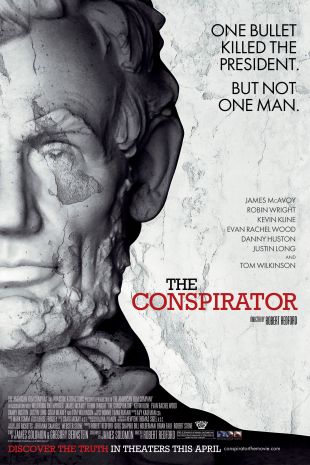
If forced to decide on a single adjective to describe Robert Redford's directorial output, "tasteful" sure seems to be the best choice. The Sundance mastermind's work behind the camera is always reserved and serious, an artistic stance that accentuates good material when he has it (Quiz Show, A River Runs Through It), but quickly leads to boredom when he doesn't (The Legend of Bagger Vance, The Horse Whisperer). His historical drama The Conspirator falls smack in the middle of these two extremes.
The movie stars James McAvoy as Frederick Aiken, a veteran of the Union Army who wants to put the war behind him and start his law practice when John Wilkes Booth, and a number of other men, carry out a plot to assassinate President Abraham Lincoln, Vice President Andrew Johnson, and Secretary of State William Seward. Frederick's deserved reputation as a war hero allows him to rub shoulders with powerful government leaders, and soon he's recruited by crusading former U.S. Attorney General Reverdy Johnson (Tom Wilkinson) to defend Mary Surratt (Robin Wright), the mother of one of the conspirators -- as well as the owner of a boarding house where the men allegedly planned their coordinated attack -- in front of a military tribunal. Still carrying a hatred for the Confederacy, Frederick wants nothing to do with the case; however, after meeting the woman, his professional ethics prompt him to mount the best defense he can. As he gathers evidence that she might have genuinely had no idea what her son was up to, Frederick develops a powerful enemy in Secretary of War Edwin Stanton (Kevin Kline), who wants Mary and the other conspirators punished quickly in order to keep the country from refighting the Civil War.

As a courtroom procedural, The Conspirator works quite well, almost like an 19th century Law & Order. As Frederick slowly discovers the various motivations behind his client's actions -- as well as the actions of her family -- McAvoy does a fine job of modulating his character's obsession with the case, slowly finding himself embroiled in it at the expense of his social standing and his fiancée. For her part, Robin Wright pulls off the nifty trick of playing a rather pathetic person without sinking into pathos. The whole cast is quite good, aside from Justin Long, whose modern-day speech rhythms are jarringly out of place in a period drama.
What keeps the film from blossoming is Redford's nagging tastefulness. The director makes savvy allusions to modern-day debates about trying war criminals in military tribunals or in civilian courts, yet the movie never fills the audience with the main character's passion -- we can see it and we can hear it, but we don't share it. By the end, when Frederick sees firsthand the limits of the legal system, and the power of the government to do whatever it pleases, the film should pack an emotional wallop. Instead, we're left with a protracted, uninspired gallows scene that doesn't accentuate our outrage -- Redford can even make a public execution tasteful.

This material begs for righteous outrage, and Redford is too reserved a filmmaker by nature. Someone like Oliver Stone would have shaped it into a provocative piece that forced audiences to take a stand. That movie would have been exploited by both the ACLU and the Tea Party in order to raise money and get their members' blood boiling. But this version of The Conspirator seems aimed at a far less demanding crowd; it's an ideal movie to show a high-school history class.
